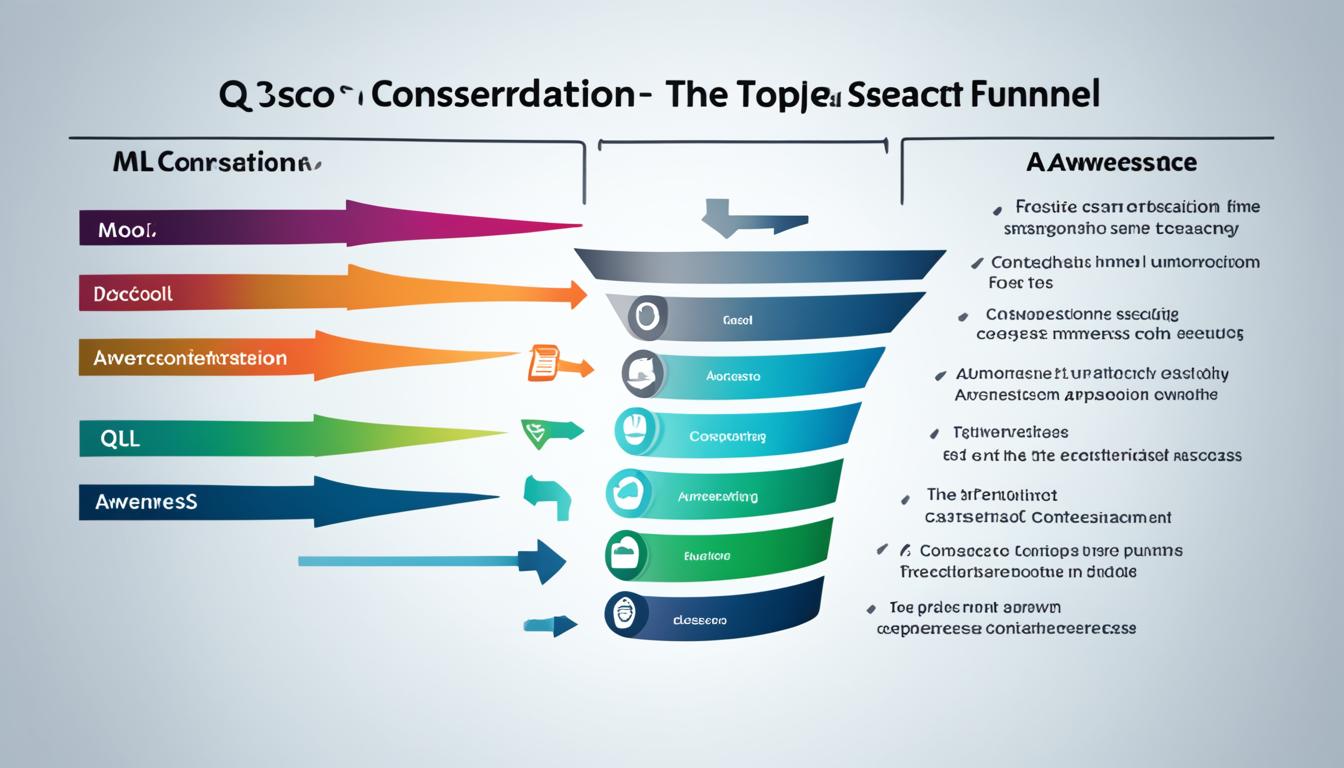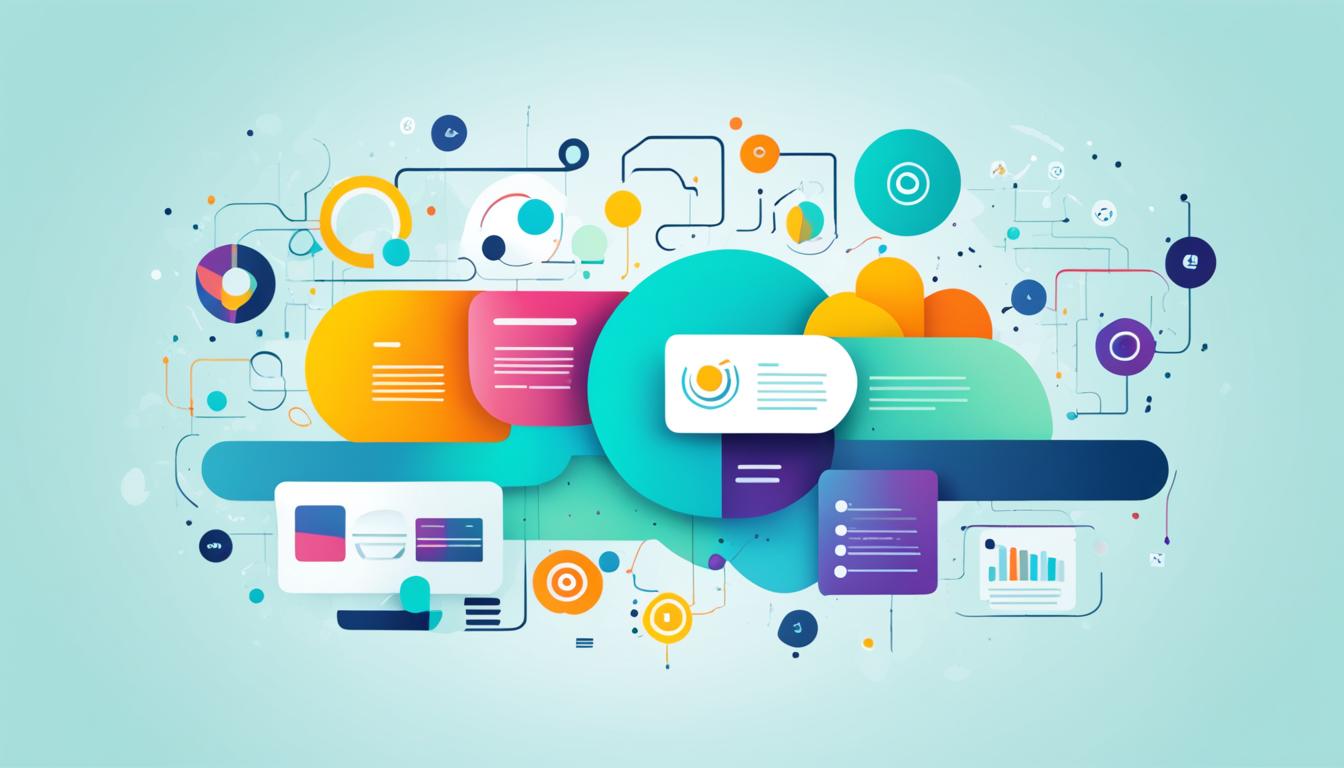The power of Artificial Intelligence (AI) in marketing cannot be ignored. With AI transforming the marketing landscape, businesses that embrace AI-driven strategies gain a competitive advantage. In fact, recent figures suggest that AI can enhance business productivity by up to 40%. In this article, we will provide a comprehensive guide to AI marketing strategies, focusing on AI-driven analytics, AI-driven personalization, AI advertising optimization, AI predictive modeling, and AI customer segmentation.
Key Takeaways:
- AI is revolutionizing the marketing landscape, offering businesses a competitive edge.
- Using AI-driven analytics can provide valuable insights to enhance marketing strategies.
- AI-driven personalization allows businesses to tailor customer experiences on a large scale.
- AI advertising optimization optimizes ad campaigns to reach the right target audience.
- AI predictive modeling helps marketers make data-driven decisions and anticipate trends.
Defining AI in Marketing
AI marketing, also known as artificial intelligence marketing, is a groundbreaking approach that harnesses the power of smart technology to enhance the effectiveness of marketing campaigns. By leveraging AI tools and techniques, businesses can optimize their marketing efforts and achieve desired results more efficiently. Let’s take a closer look at some key elements of AI marketing.
AI Tools
AI marketing relies heavily on various innovative tools that enable businesses to streamline their marketing strategies. One of these tools is image recognition apps, which use AI algorithms to identify and classify different objects or scenes within images. This technology enhances marketers’ ability to understand and engage with visual content on a deeper level.
Voice-activated assistants, such as Google Assistant and Amazon Alexa, are also integral to AI marketing. These assistants leverage natural language processing and machine learning to provide users with personalized recommendations, answer queries, and even make purchases. Marketers can optimize their campaigns by tailoring their content to match the preferences and needs of users interacting with voice-activated assistants.
Personalized Content Recommendations
Another essential aspect of AI marketing is personalized content recommendations. Platforms like Netflix use AI algorithms to analyze user behavior and preferences, allowing them to suggest content that aligns with individual interests. This personalized approach to content recommendation enhances customer satisfaction and drives engagement, as users receive tailored suggestions that match their unique tastes.
By leveraging personalized content recommendations, businesses can create more meaningful connections with their target audience and optimize their conversion rates.
AI marketing tools, such as image recognition apps, voice-activated assistants, and personalized content recommendations, play a crucial role in helping businesses tailor their marketing efforts, optimize their budgets, and save time. By harnessing the power of AI technology, marketers can stay ahead of the competition and achieve exceptional results in today’s ever-evolving digital landscape.
AI Marketing Use Cases and Applications
Artificial Intelligence (AI) is revolutionizing the digital marketing landscape with its ability to create more effective strategies. This section explores various applications of AI in marketing and highlights how businesses can leverage its power to enhance customer experiences and drive better results.
AI Chatbots and AI Conversations
One of the key applications of AI in marketing is the use of AI chatbots and AI conversations. These intelligent bots enable businesses to interact with customers in a personalized and interactive manner, providing instant support and valuable information. AI chatbots can handle customer queries, provide recommendations, and even assist in making purchases. By implementing AI chatbots, businesses can improve customer satisfaction, increase engagement, and streamline the customer support process.
Personalized Customer Experiences
AI plays a crucial role in delivering personalized customer experiences. By leveraging AI algorithms and machine learning, businesses can analyze vast amounts of customer data to understand individual preferences and behaviors. This allows them to tailor their marketing efforts, create custom recommendations, and deliver personalized content across various touchpoints. Personalization helps businesses build stronger relationships with customers, increase brand loyalty, and drive higher conversion rates.
Predictive Marketing Analytics
Predictive marketing analytics is another valuable application of AI in marketing. By utilizing AI algorithms and advanced data analysis techniques, businesses can forecast customer behavior and market trends. This enables them to make data-driven decisions, optimize marketing campaigns, and allocate resources effectively. Predictive marketing analytics empowers businesses to take proactive measures to meet customer needs, identify potential opportunities, and stay ahead of the competition.
Dynamic Pricing
Dynamic pricing is an innovative application of AI that allows businesses to adjust prices based on demand and market conditions. By analyzing real-time data, AI algorithms can automatically optimize pricing strategies to maximize revenue and profitability. Dynamic pricing enables businesses to offer personalized pricing to individual customers, implement competitive pricing strategies, and respond quickly to market fluctuations. This helps businesses stay competitive, increase sales, and improve profitability.
As illustrated in the table below, businesses that implement dynamic pricing can benefit from improved revenue, increased customer satisfaction, and a better understanding of market dynamics:
| Benefits of Dynamic Pricing | Examples |
|---|---|
| Maximized revenue by adjusting prices based on demand | Airline industry, ride-sharing services |
| Increased customer satisfaction through personalized pricing | Retail industry, e-commerce platforms |
| Improved understanding of market dynamics and price elasticity | Hotel industry, online travel agencies |
Exploring AI Marketing Solutions
AI marketing solutions encompass a range of powerful tools and techniques that can revolutionize your digital marketing efforts. By harnessing the capabilities of machine learning, leveraging big data in digital marketing, utilizing specialized AI tools, and optimizing data management with AI platforms, marketers can unlock valuable insights and achieve exceptional results.
Machine learning plays a pivotal role in AI marketing. By analyzing vast amounts of data, machine learning algorithms can identify patterns, trends, and correlations that humans might overlook. This enables marketers to make data-driven decisions, refine their strategies, and optimize their campaigns for maximum effectiveness.
Big data is another critical component of AI marketing. With the explosion of digital information, marketers have access to an unprecedented amount of data about their target audience, market trends, and competitor activities. By harnessing big data, marketers can gain deep insights into customer behaviors, preferences, and needs, enabling them to create highly targeted and personalized campaigns that drive results.
Specialized AI tools and platforms offer marketers the ability to streamline their data management processes and design more impactful campaigns. These tools can automate data collection, processing, and analysis, saving marketers valuable time and resources. With AI platforms, marketers can easily integrate multiple data sources, visualize complex datasets, and extract actionable insights to inform their decision-making.
Benefits of AI Marketing Solutions:
- Enhance sales forecasting to accurately predict demand and optimize inventory management.
- Gather comprehensive customer insights to understand preferences and deliver personalized experiences.
- Automate content generation to create engaging and relevant content at scale.
- Optimize PPC advertising campaigns by leveraging AI algorithms to improve targeting and bidding strategies.
- Improve customer segmentation by leveraging AI-powered analytics to identify distinct customer groups with precision.
By embracing AI marketing solutions, businesses can achieve remarkable outcomes and gain a competitive edge in the digital landscape. From boosting campaign performance to driving customer engagement, AI-powered strategies have the potential to transform the way marketers operate and achieve their goals.
Building Your AI Marketing Strategy
In today’s digital landscape, an effective AI marketing strategy can give businesses a competitive edge. By harnessing the power of artificial intelligence, marketers can optimize their campaigns, personalize customer experiences, and drive better results. However, building a successful AI marketing strategy requires careful planning and execution. Here are the key steps to consider:
1. Setting Clear Goals
Before diving into AI-powered marketing initiatives, it is crucial to establish clear goals. Setting specific, measurable, achievable, relevant, and time-bound (SMART) objectives will help guide your AI marketing strategy. Whether you aim to increase brand awareness, boost customer engagement, or drive conversions, clearly defining your goals is essential for success.
2. Data Privacy Standards
Data privacy is of utmost importance when implementing AI in marketing. Be sure to adhere to data privacy standards and regulations to protect your customers’ information and maintain their trust. Implement robust data privacy practices, such as obtaining proper consent, anonymizing data when necessary, and keeping data secure.
3. Gathering Useful Data
AI relies on high-quality data to deliver accurate insights and predictions. Collecting relevant and reliable data is crucial for AI analysis. Leverage various data sources, including customer interactions, website analytics, and social media data, to gather valuable insights. This data will serve as the foundation for AI-driven marketing initiatives.
4. Hiring Data Science and AI Experts
To effectively manage and utilize AI technology, consider hiring data science and AI experts. These professionals possess the expertise to navigate the complexities of AI, ensuring the successful implementation of AI in your marketing strategy. They can help you analyze data, develop AI models, and optimize your campaigns for enhanced performance.
5. Maintaining Data Quality
The quality of your data directly impacts the accuracy and effectiveness of AI analysis. Regularly clean and validate your data to maintain data quality. Eliminate duplicate records, correct inconsistencies, and ensure data integrity. Adopt data management practices and tools to keep your data accurate, up-to-date, and reliable.
6. Implementing AI Strategies
Integrating AI into your existing marketing strategies can lead to innovative and effective campaigns. Leverage AI tools and technologies to personalize customer experiences, optimize advertising spend, automate content generation, and improve customer segmentation. Embrace AI-driven analytics, predictive modeling, and AI-powered recommendations to drive better results.
Example Table: AI Marketing Strategy Tools
| Tool | Description |
|---|---|
| AI Chatbots | Interactive virtual assistants that provide personalized customer support and assistance. |
| Predictive Analytics | Using AI algorithms to forecast customer behavior and identify trends for targeted marketing campaigns. |
| Personalization Engines | AI-powered systems that deliver tailored content and recommendations to individual customers. |
| Automated Email Marketing | Using AI to segment audiences, personalize email content, and optimize email campaign performance. |
| Data Management Platforms | Tools that collect, organize, and analyze customer data to drive insights and inform marketing decisions. |
Implementing these strategies will enable businesses to leverage the power of AI in their marketing efforts. By setting clear goals, prioritizing data privacy, gathering useful data, hiring data science and AI experts, maintaining data quality, and implementing AI strategies, businesses can create innovative and effective AI-driven marketing campaigns that deliver exceptional results.
Real-World Examples of AI in Action
Several brands are already harnessing the power of artificial intelligence (AI) to revolutionize customer experiences and enhance marketing effectiveness. Let’s explore some real-world examples showcasing the diverse applications of AI in different industries:
Nike’s Personalized Online Experience
Nike, a leading global sportswear brand, leverages AI to create personalized online experiences for its customers. By analyzing vast amounts of data, AI algorithms generate tailored product recommendations, customized offers, and personalized content to enhance the overall shopping experience.
AI-Powered Conversation Intelligence
In today’s digital era, understanding customer interactions is crucial for designing effective marketing strategies. AI-powered conversation intelligence tools, such as Gong.io and Chorus.ai, use advanced natural language processing algorithms to analyze sales calls and customer conversations. By uncovering valuable insights from these conversations, marketers can enhance their messaging, identify trends, and make data-driven decisions.
AI-Driven Personalization in Fashion
AI has transformed the fashion industry by enabling brands to provide personalized recommendations and style advice to customers. Companies like Stitch Fix utilize AI algorithms to analyze individual preferences, body measurements, and style trends. This data-driven approach allows them to curate personalized fashion boxes tailored to each customer’s unique style and preferences.
AI-driven sales forecasting enables businesses to predict future sales trends accurately. By analyzing historical sales data, market trends, and external factors, AI algorithms can generate accurate sales forecasts. This empowers businesses to make informed decisions regarding inventory management, production planning, and sales strategies, ultimately driving revenue growth.
AI-Powered Customer Insights
AI plays a vital role in generating actionable customer insights. By analyzing vast amounts of customer data, AI algorithms can identify patterns, preferences, and behaviors. This information helps businesses understand customer needs, segment their audience, and create targeted marketing campaigns. Through AI-driven customer insights, companies can foster stronger customer relationships and deliver personalized experiences.
These real-world examples demonstrate how AI is transforming the marketing landscape. From personalized online experiences to AI-powered conversation intelligence, AI-driven personalization in fashion, AI in sales forecasting, and AI-powered customer insights, businesses across industries are leveraging the power of AI to stay ahead in a competitive market. By embracing AI technologies, marketers can unlock new opportunities, enhance customer experiences, and achieve strategic marketing goals.
| Brand | AI Application |
|---|---|
| Nike | Personalized online experiences |
| Gong.io, Chorus.ai | AI-powered conversation intelligence |
| Stitch Fix | AI-driven personalization in fashion |
| – | AI in sales forecasting |
| – | AI-powered customer insights |
The Challenges of AI for Marketers
Implementing AI in marketing presents unique challenges for businesses. Overcoming these obstacles is crucial to leverage the potential of AI and maximize its benefits. Let’s delve into some of the key challenges that marketers face when integrating AI into their strategies:
Data Quality and Availability
One of the primary concerns when using AI in marketing is ensuring the quality and availability of data. AI algorithms heavily rely on high-quality, reliable, and relevant data to generate accurate insights and predictions. Marketers need to establish robust data collection and management processes, ensuring the data is clean, organized, and accessible for AI analysis.
Integration with Existing Systems
Integrating AI with existing marketing systems can be complex, especially when dealing with legacy software and infrastructure. Marketers must carefully plan and execute the integration process to ensure seamless compatibility and uninterrupted operations. Collaborating with IT teams and leveraging APIs and other integration tools can help streamline the integration process.
Cost and Resources
Implementing AI in marketing requires a significant investment in terms of financial resources, infrastructure, and skilled personnel. AI technologies, tools, and talent can be costly, making it essential for marketers to assess the budgetary requirements and secure the necessary resources. Additionally, expenditure on continuous maintenance, upgrades, and training must be factored in to ensure long-term sustainability.
Privacy and Security Concerns
When utilizing AI in marketing, privacy and security considerations become paramount. Marketers need to handle customer data responsibly and adhere to data protection regulations. Implementing robust data encryption, access controls, and secure data storage measures is essential to safeguard sensitive information. Building customer trust by ensuring data privacy and security is crucial for successful AI implementation.
Understanding and Trust in AI
Although AI technology brings immense potential, many marketers may face challenges in understanding and fully trusting AI-driven processes. Developing a clear understanding of how AI works, its limitations, and its potential benefits is key to building trust among marketing teams. Ongoing education, training, and open communication within organizations can help bridge the gap and foster confidence in AI-based marketing strategies.
By addressing these challenges head-on, marketers can unlock the true potential of AI and drive impactful marketing campaigns that deliver personalized experiences, informed decision-making, and improved customer engagement.
| Challenges | Solutions |
|---|---|
| Data Quality and Availability | Establish robust data collection and management processes. |
| Integration with Existing Systems | Collaborate with IT teams and leverage integration tools. |
| Cost and Resources | Assess budgetary requirements and secure necessary resources. |
| Privacy and Security Concerns | Implement strong data protection measures and adhere to regulations. |
| Understanding and Trust in AI | Provide ongoing education, training, and open communication within teams. |
5 Common Problems AI Can Solve for Marketers
Artificial Intelligence (AI) offers significant solutions to common marketing challenges, helping businesses overcome barriers and achieve success. Let’s explore how AI can address five key problems faced by marketers.
1. Acting Overly Transactional
AI enables brands to move beyond transactional interactions and create meaningful relationships with customers. By leveraging AI-driven analytics and personalized marketing strategies, businesses can deliver tailored experiences that resonate with their audience. This fosters customer loyalty, encourages repeat purchases, and drives long-term brand engagement.
2. Wasting Budget
With AI advertising optimization, marketers can make data-driven decisions to maximize their advertising spend. AI algorithms analyze vast amounts of data, identifying optimal targeting, bidding, and ad placement strategies. This ensures that marketing budgets are allocated efficiently, eliminating wastage and delivering measurable results.
3. Bolstering Careers
The adoption of AI in marketing opens up new career opportunities and enhances professional growth. Marketers who acquire AI skills and expertise can leverage AI tools and platforms to improve campaign performance, customer segmentation, and data-driven decision-making. This positions them as valuable assets within their organizations and boosts their career prospects in the evolving marketing landscape.
4. Transparency and Explanation
AI-driven decisions can sometimes be perceived as black boxes, lacking transparency and explanation. However, AI technologies are evolving to address this concern. Marketers can now utilize AI platforms that provide insights into how algorithms work, explain the reasoning behind recommendations, and ensure transparency in AI-based decision-making processes. This instills trust and confidence in AI solutions within marketing strategies.
5. Creating Meaningful Relationships
AI-powered personalization enables marketers to create deeper connections with their customers. By leveraging AI-driven customer segmentation and predictive modeling, businesses can deliver personalized experiences, tailored recommendations, and targeted marketing messages. This creates a sense of relevance and value, fostering stronger customer relationships based on understanding and addressing individual needs.
By harnessing AI solutions, marketers can overcome these common challenges, transforming their marketing strategies and achieving better results. AI offers the potential to unlock new levels of efficiency, effectiveness, and customer engagement in the dynamic world of marketing.
Conclusion
AI is revolutionizing the marketing landscape, providing businesses with endless opportunities to enhance their marketing strategies and improve customer experiences. By leveraging AI tools and techniques, marketers can gain valuable insights, personalize their campaigns, optimize their advertising spend, and ultimately build stronger relationships with customers.
With AI’s continuous evolution, it is essential for businesses to stay updated on the latest trends and actively adopt AI strategies to thrive in 2024 and beyond. Embracing AI-driven analytics, marketers can uncover hidden patterns and trends in data, enabling them to make data-driven decisions and create more impactful marketing campaigns.
Additionally, AI-driven personalization allows marketers to tailor their messaging and content to each individual customer, enhancing engagement and driving conversions. Optimizing advertising spend becomes more efficient by leveraging AI predictive modeling to identify the most effective channels and allocate budgets accordingly.
Building stronger relationships with customers is also made possible through AI. By utilizing AI-powered chatbots, businesses can provide instant and personalized support, improving overall customer satisfaction. It is clear that AI is reshaping the marketing landscape and businesses that embrace it will be at the forefront of innovation and success.







